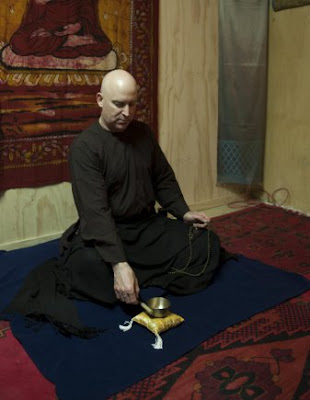The Origin of Stress and the Benefits of Meditation Psychologists tell us that it is not outward conditions of over-stimulation alone tha...
The Origin of Stress and the Benefits of Meditation
Psychologists tell us that it is not outward conditions of over-stimulation alone that threaten us; it is our perception of these conditions that have even greater impact. Psychoneuro-immunologist Dr. Myrin Borysenko gave the following definition of stress at the 1992 Mind/Body Fitness Conference held in Santa Fe, New Mexico: |
| The Origin of Stress and the Benefits of Meditation |
"Stress is the perception of a threat and the perception of one's inability to cope with that threat."
Perception is something that we can modify by re-grinding the lens through which we see. Therefore, stress is something we can control. We can change how stressors affect us. To change our lives we must first change our perception of what is possible.
As a test for the importance of perception, recall a time when you learned a new word. Immediately you began to hear this word everywhere. It was as if this word did not exist until you learned its meaning. Once known, this word appeared all around you. Was it not there before? The reality was there, you just did not have the lens through which to see it. Language, perception, and reality are interwoven. As an example of this, in qigong meditation, we learn the language of qi, of subtle energy flow, and learn how to positively influence the flow of qi to reduce stress and increase our health and well-being.
The next key to the definition of stress is that it has two parts. The first part relates to the power of a threat and the second relates to our own abilities and resources. Threats are stressors we perceive as outside our control. When we are repeatedly faced with stressors that we perceive as beyond our ability to deal with them, we develop patterns of spiritual resignation.
Yoga teacher Linda Christy Weiler says "Patterns of resignation are bodily indicators of trauma, submission, and lack of freedom. These patterns are characteristic behaviors, postures, and mannerisms that indicate the underlying emotions of fear, guilt, anger, or sorrow. These patterns imply that something in one's body and one's psyche has been relinquished or diminished." (Yoga For Prevention of Low Back Pain, Brentwood, TN: 2005, p. 4).
What is diminished in us that leads us to feel stress? We have lost awareness of our essential vitality. In qigong, we recover the joyful flow of universal qi through our bodies and experience a feeling of unity with the wholeness of life. When we allow universal qi to flow smoothly through us, we experience health and well-being. When we are unconscious of the flow of life force within us, we become tense, fearful, and overwhelmed by life's stress. In stress mode, we restrict the flow of qi physically, emotionally, mentally, and spiritually.
When universal qi flows smoothly through us, it harmonizes body, emotion, mind, and spirit. According to James MacRitchie "Characteristics of this state are feeling calm, clear, relaxed, aware, strong, centered, whole, integrated, balanced and fully alive--to name but a few" (The Chi Kung Way, San Francisco: Thorsons, 1997, p.xi). MacRitchie calls this state of being a "Chi Kung State" ("chi kung" is an alternate spelling for "qigong"). I like to call it a Core Energy State because in this state we are aware of the universal life force within us.
Core Energy is the universal life force within each of us. A Core Energy State occurs when we are aware of universal qi flowing smoothly through all layers of our being.
The key, then, is how do we awaken this awareness? How do we shift from a state of stress to a state of consciously smooth flowing qi?
Meditation is one of the most powerful techniques to facilitate a Core Energy State. Qigong meditation, in particular, is a holistic system that provides cues to facilitate conscious awareness and smooth qi flow. By holistic I mean that qigong works with body, emotion, mind, and spirit to consciously affect the flow of universal qi through the whole person.
Physical exercise systems usually work with physical movement, breathing, and posture. Most meditation systems work with emotional attitude, mental focus, and spiritual intention. Qigong combines all of these into a complete system of self-development. Within qigong itself, some systems emphasize physical movement while others emphasize still meditative practice. In my Learn Qigong Meditation Course, we emphasize the still meditative component. Though the emphasis is meditative, the practice involves cues for body, emotion, mind, and spirit and positively benefits these four layers of self.
The Benefits of Qigong Meditation:
1. Reduce stress and create vitality in your body. Qigong meditation relaxes tension, improves blood and lymphatic flow, improves nerve conductivity, positively affects brain waves, brain coherence, and brain chemistry enhances the efficiency of all physiological systems and increases immune response and longevity.
2. Balance your emotions and open your heart. Qigong releases emotional holding patterns and opens appropriate emotional responsiveness.
3. Clear, expand, and focus your mind. Qigong is a great meditation system for active minds. It develops your ability to focus your attention, release from negative mindsets, and observe yourself with detachment.
4. Develop spiritual empowerment. Qigong enhances your spiritual awareness by producing a feeling of wholeness and integrity. It improves your ability to cultivate and refine the universal life force within you. Qigong empowers you to actively participate in creating the life you desire.















COMMENTS